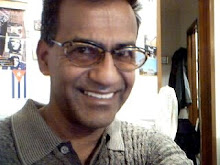Tuesday, 28 July 2009
From MoPoTsyo to Middle America
Friday, 3 July 2009
Kaddish for Cecil Helman the best Clinical Medical Anthropologist

Cecil Helman was born in Cape Town, South Africa into a medical family, and qualified as a doctor at the University of Cape Town Medical School. He left South Africa because of the apartheid system, and then studied social anthropology at University College London Over the years he has combined several different careers into a creative synthesis: family doctor, anthropologist, university lecturer, writer and poet. After a brief spell as a ship’s doctor in the Mediterranean, he worked as a family doctor for 27 years for the National Health Service, in an around London, combining his clinical practice with a distinguished academic career. | |
His recent memoir Suburban Shaman: Tales from Medicine’s Frontline’, was described by Oliver Sacks (author of The Man Who Mistook His Wife for a Hat) as ‘a beautifully written, devastatingly honest, and often very funny, account of an audacious and adventurous life’ It received widespread critical acclaim, and was given the rare honour of being selected by the BBC as a ‘Book of the Week’, and then serialized on BBC Radio in March 2006. Dr Helman is an international expert on medical anthropology – the cross-cultural study of health, illness, and medical care – and on the many different forms of healthcare and healing found worldwide. He has done research on primary health care systems, and on traditional healers, in South Africa, Brazil, and elsewhere. His textbook Culture, Health and Illness has been used in more than 40 countries since it was first published in 1984, including in over 120 universities, medical schools and nursing colleges in the USA and Canada. He has also published academic papers in medical journals, including The Lancet, British Medical Journal, Annals of Internal Medicine, British Journal of General Practice, and Medical Humanities, He has received several prestigious international prizes and awards for his work. He has been a Visiting Fellow in Social Medicine and Health Policy at Harvard Medical School; a Visiting Professor in the Multi-cultural Health Programme at University of New South Wales, Sydney, Australia; and Hooker Distinguished Visiting Professor in the Department of Anthropology, McMaster University, Ontario, Canada. He has also been a guest lecturer in many universities, including those of Cambridge, Oxford, London, Durham, Geneva, Barcelona, Amsterdam, Leuven, and Cape Town, and has given the David Rogers Health Policy Colloquium at Cornell Medical School in New York, and the Cabot Lecture at Harvard Medical School.On the literary side, he has published both non-fiction and fiction, including a memoir, a book of essays about the body, an anthology of stories about doctors and patients, a novella, and several books of prose poems. He has always been fascinated by prose poems, and by their similarity to traditional myths, legends, allegories and midrashim. His poetry and other writings have appeared in many anthologies and literary journals (including London Magazine, Ambit, Paris Voices and Tikkun), but he has also written for British Vogue andThe Observer Magazine. Dr Helman lives in Britain, but re-visits South Africa frequently, and is currently working on a sequel to Suburban Shaman. He lectures to medical students, doctors, and nurses, teaches courses on cross-cultural health care, and has run creative writing courses for doctors. He is particularly interested in the humanistic side of medicine - especially the role of stories and narratives in medical care, and what they reveal about the inner worlds of both doctor and patient. Among his other interests are the role of metaphors and symbols in our understanding of the human body, in both illness and health; and what the Western industrialized world can learn from the healing systems of more traditional societies, when dealing with different aspects of human suffering. | |
